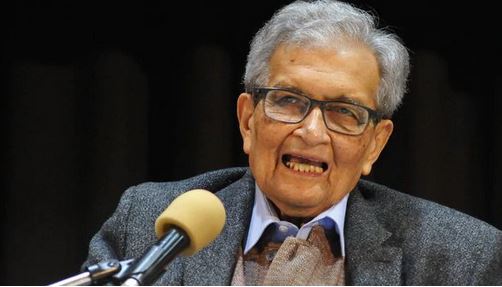
India needed more democracy than it had during COVID-19: Amartya Sen

Indian economist and Nobel laureate Amartya Sen has said that the Centre’s nonchalance towards migrant labourers following the outbreak of the COVID-19 pandemic last year was proof that “India needed much more democracy that it was allowed”.
Stressing how India, once prone to British excesses, became free of famines once a democratic government was set up after Independence, Sen said free speech, one of the tenets of democracy, is what makes a governments accountable to their people.
“…public criticism and scrutiny would make it hard for a terrible government to survive,” the Nobel laureate told the Indian Express in an interview.
Sen said while the strength of a democracy reflects in the way it treats its poor, nothing of the sort was seen in India during the pandemic.
Also read: An united opposition makes any protest easier: Amartya Sen
“…the poor has had little voice in policy making. It was amazing that when the first lockdown was imposed, the interests of the poor rather than getting special attention were quite neglected. The poor dependent on finding jobs with wages could not even look for jobs, confined as they were. The migrant labourers far away from their home had to rely on walking back home, since the transport was discontinued shortly after the official announcement of the lockdown,” he added.
He agreed that the country does suffer from widespread suppression of public discussion, either by police action or by “punitive arrangement”. He says even though introducing electoral reforms can be a way to make governments more responsive and discussion-oriented, they still won’t address the “overuse of Executive powers by the Central authorities”.
“Just check how many people are incarcerated without being tried, how many people are silenced through authoritarian force,” he said.
Sen called the death of Father Stan Swamy, who recently died in jail while waiting for bail in the Bhima Koregaon violence case, a classic example of the judiciary failing in its “protective role”. “The government, instead of providing him protection, made his life more precarious, more difficult, through adverse use of legal means. One result of it was that he was in a much more fragile state than he should have been. Could the judiciary have helped him more? The issue that has to be examined is whether the judiciary failed to keep the excesses of the Executive in check,” he said.
Alluding to the huge discrepancy in vaccination and approach towards COVID management seen between rich and poor countries of South Asia, Sen said the moment calls for the region to share resources while maintaining social distancing.
“We have to think about how it is possible to maintain physical distance, but not be economically or socially separated. Our protections can be shared (through getting vaccinated and other means), while taking particular care not to make the poor specially prone to unemployment and to further deprivation,” he told IE.
Also read: ‘I’m not proud as an Indian,’ says Amartya Sen on Kashmir move
On the matter of Assembly elections being held in West Bengal in the peak of the second wave of the pandemic, Sen, who hails from the state, said it was a “tragic choice” for both the ruling Trinamool Congress, and the BJP, which was looking at making inroads into the state, to make.
“…the BJP, which had never held office in West Bengal, was very keen that elections take place, which the BJP was definitely hoping to win…They couldn’t have said at that time that ‘let’s not have an election’, which would have looked like a sudden lack of self-confidence. For the secular parties, particularly Trinamool, to try to call off the election would have looked like not giving the BJP a chance, ” he said, adding that future polls, however, can be better planned.


